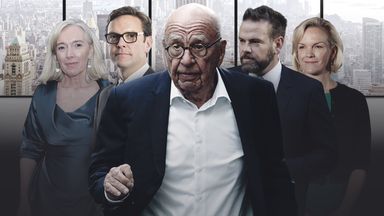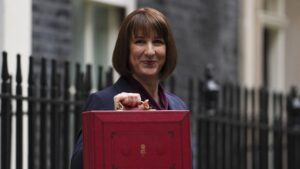Succession battle: Why Rupert Murdoch and his children are fighting in court
The fate of a string of newspapers and television channels consumed by millions of people around the world looks set to be decided by a court in Nevada amid a multi-billion pound rift in the 93-year-old’s family.

A momentous court battle over the fate of Rupert Murdoch’s media empire gets under way in Nevada today.
At stake is the future of a string of newspapers and television channels consumed by millions of people around the world, as well as thousands of jobs – and billions of pounds.
The media mogul, who turned 93 this year, has spent decades building up his news brands, making them some of the most powerful and influential in the Western world.
But now, as he nears the end of his life, a rift has opened up in his family – and raised questions about what kind of legacy he will leave behind.
The case will decide who controls Murdoch’s family trust after he is gone and which of his children will have major voting rights in his companies. And it could result in the billionaire’s heir apparent Lachlan Murdoch being out-manoeuvred by some of his less conservative siblings.
What are his family members fighting over?
The row centres around future power and influence over Mr Murdoch‘s two companies – News Corp and Fox.
News Corp owns newspapers including The Wall Street Journal and the New York Post in the US, The Australian, The Herald Sun and The Daily Telegraph in Australia, and The Sun, The Times and The Sunday Times in the UK.
Also under News Corp’s wing is publishing giant HarperCollins, along with several Australian TV channels.
Meanwhile, Fox News, Fox Sports and streaming service Tubi form part of his other major company.
Mr Murdoch has a roughly 40% stake in voting shares of each company.
Sky News, which Mr Murdoch launched in the UK in 1989, is no longer part of his empire.
At the end of 2018, Fox’s film entertainment assets, such as The Simpsons and the Avatar film franchise, were sold to Disney – while the company’s 39% stake in Sky was sold to Comcast.
Who is involved in the case and why?
Sorting out Mr Murdoch’s inheritance was never going to be easy – he has six children and has been married five times, most recently to retired molecular biologist Elena Zhukova.
However, it had long been presumed that his business succession plans were largely settled in 1999, following his divorce from his second wife Anna.
That year the Murdoch Family Trust was founded – establishing the principle that, when he died, his News Corp and Fox’s voting shares would be divided between his four oldest children – Prudence, Elisabeth, Lachlan and James.
Following the “irrevocable” agreement, Mr Murdoch began integrating some of his children into roles at his companies.
However, following a shift in relations with some of his offspring, it emerged earlier this year that the media mogul had changed his mind.
The New York Times revealed that Mr Murdoch had decided he wanted to change the terms of the trust, to ensure his eldest son Lachlan would go on to run his businesses without “interference” from his other siblings.
The newspaper reported that James, Elisabeth and Prudence “were caught completely off-guard” by the move and had decided to unite to stop him.
Lachlan has reportedly taken his father’s side in the case.
Why did Murdoch change his mind?
The billionaire’s efforts to tweak the terms of the family trust come amid signs that he has increasingly favoured Lachlan as his chosen heir in recent years.
When Mr Murdoch revealed last year he was stepping down as chair of Fox and News Corp, it was announced that his eldest son would become the sole chair of News Corp – while also continuing as executive chair and chief executive of Fox.
The main reason, it is thought, is politics. Lachlan is seen as more similar and aligned with his father’s right-wing views, while James, Elisabeth and Prudence are seen as more moderate in their beliefs.
Indeed, the media mogul’s decision to give Lachlan “permanent, exclusive control” came amid worries over the “lack of consensus” among his children about the future of the Murdoch brands, according to court documents seen by The New York Times.
Read more:
Rupert Murdoch: Success and controversy
End of era as 21st Century Fox exits Sky
Be the first to get Breaking News
Install the Sky News app for free


James has been openly critical of Fox News – and recently endorsed Democrat Kamala Harris for president – while his sister Elisabeth has also “privately expressed discomfort about being associated with Fox News”, according to the Wall Street Journal.
The newspaper, which is owned by Mr Murdoch, also reported that “putting more power in Lachlan’s hands is meant to ensure stability at the businesses and avoid a confusing ownership structure in coming years”.
It quoted sources who said Mr Murdoch had been “dismayed that James and his wife seemed to be embarrassed by Fox yet were happy to enjoy the fruits of its financial success”, with the two not said to be on speaking terms.
So what’s going to happen?
Despite the family rift, there is one thing the Murdochs involved agree on – they do not want their media rivals to feast on their fallout.
Consequently, the hearing to settle the dispute is being held in private – despite attempts from news agencies to grant public access – behind closed doors at the Washoe County Courthouse in Reno, Nevada, with probate commissioner Edmund J Gorman Jr due to rule on the case.
An earlier hearing concluded that Mr Murdoch could change the terms of the trust – if he could demonstrate he was acting in good faith, for the sole benefit of his heirs.
If the billionaire wins, News Corp and Fox are expected to continue along the same path after his death under Lachlan’s leadership, with, for example, Fox News continuing to loudly back the Republican Party in the US.
However, if the three siblings win, a battle over the future of the firms is likely to ensue. In theory, they could challenge the political leaning of Murdoch’s newspapers and channels, or even sell them off – as they could out-vote Lachlan on key decisions.
A third possibility is a compromise or some other kind of settlement being reached. Talks have reportedly been held in recent weeks over James and his sisters selling their stakes in the trust. However, these are said to have failed – possibly due to the potentially high sums involved.
The Murdochs involved have made no public statement on the case, with their spokespeople either declining to comment or not responding to requests.
It also comes amid uncertain times for the future of the news industry.
In an interview earlier this summer with Sky News Australia – which is separate from Sky News in the UK – Mr Murdoch predicted that printed newspapers will die out within 15 years due to changes in the ways people consume news.
If he is right, some of the tough questions facing his successors could be far bigger than just which party to back.



